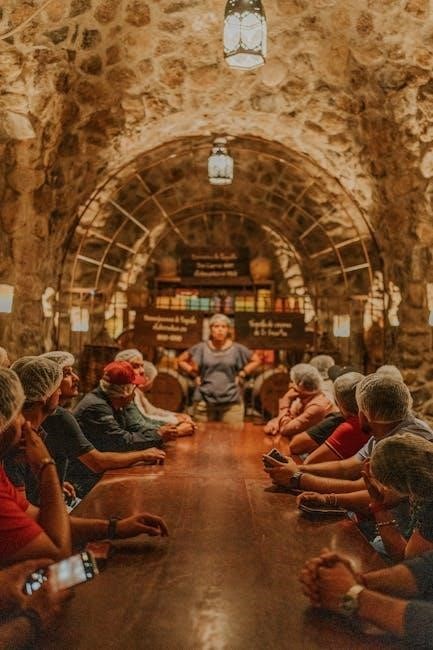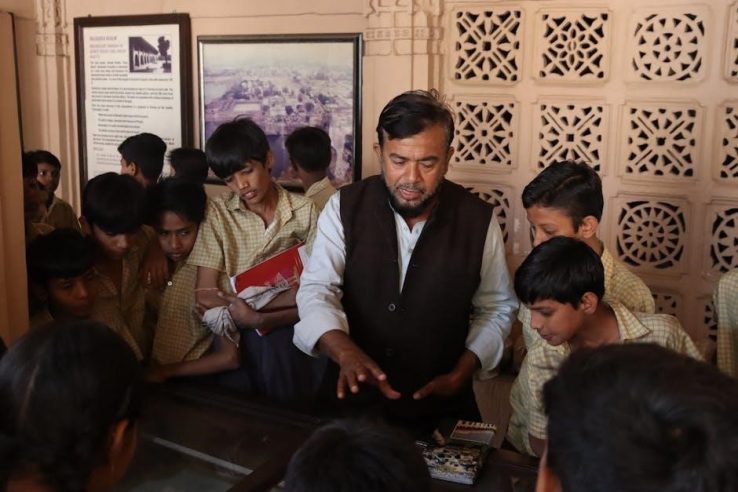Filipina tour guides play a vital role in showcasing the Philippines’ rich culture, history, and natural beauty, serving as ambassadors who connect visitors with the country’s unique heritage.
1.1 The Importance of Tourism in the Philippines
Tourism is a cornerstone of the Philippine economy, generating significant revenue and creating jobs. It highlights the country’s diverse natural wonders, vibrant culture, and historic landmarks, attracting global visitors. Filipina tour guides are essential in showcasing these treasures, offering insights that enrich travelers’ experiences. Their role bridges cultural gaps, fosters understanding, and promotes the Philippines as a must-visit destination, contributing to national pride and economic growth.
1.2 The Role of Filipina Tour Guides in Promoting Culture
Filipina tour guides serve as cultural ambassadors, showcasing the Philippines’ rich heritage through storytelling, traditions, and local insights. They bridge cultural gaps by sharing history, festivals, and daily life, making the culture accessible and engaging. Their passion fosters appreciation and preserves heritage, enriching visitors’ experiences and promoting national pride. By highlighting unique traditions and historical sites, they create meaningful connections, inspiring tourists to respect and value Filipino customs, ensuring the culture’s legacy endures for future generations.
Who Are Filipina Tour Guides?
Filipina tour guides are passionate, knowledgeable professionals who connect visitors with the Philippines’ vibrant culture, history, and landscapes, offering expert insights and memorable experiences.
2.1 Background and Professional Qualifications
Filipina tour guides often hold degrees in tourism, hospitality, or related fields, with certifications from the Department of Tourism. They undergo rigorous training to develop deep knowledge of local history, culture, and geography. Many are multilingual, fluent in English and regional dialects, enhancing their ability to connect with diverse clientele. Their professional journey includes workshops, seminars, and continuous learning to refine their skills. This comprehensive background ensures they provide authentic, engaging, and culturally rich experiences, making them indispensable in the Philippine tourism industry.
2.2 Personal Qualities and Traits of Effective Tour Guides
Effective Filipina tour guides possess excellent communication skills, enabling them to connect with diverse clients. They are empathetic, adaptable, and personable, creating memorable experiences. Their ability to read audiences and customize tours enhances guest satisfaction. Passion for sharing local culture and history is evident, fostering deeper connections. These traits, combined with strong problem-solving skills, allow them to handle challenges gracefully, ensuring seamless and enjoyable tours. Their dedication and genuine love for their work make them standout professionals in the tourism industry.
Roles and Responsibilities
Filipina tour guides have multifaceted roles, from planning itineraries to ensuring safety and comfort. They provide local insights, manage group dynamics, and create meaningful travel experiences, showcasing the Philippines’ beauty and culture.
3.1 Planning and Organizing Itineraries
Filipina tour guides excel in creating tailored itineraries, ensuring a seamless travel experience. They research destinations, activities, and logistics, crafting schedules that balance sightseeing, relaxation, and cultural immersion. By considering client preferences and budgets, they design personalized plans that highlight the Philippines’ iconic landmarks and hidden gems. Effective time management and local knowledge enable them to optimize routes, avoiding bottlenecks and enhancing the overall journey. Their attention to detail ensures that every tour is memorable, reflecting the country’s diverse heritage and natural beauty.
3.2 Providing Local Knowledge and Insights
Filipina tour guides offer deep insights into the Philippines’ history, culture, and traditions. Their extensive local knowledge enriches tours, providing visitors with a authentic understanding of the country’s heritage. From historical landmarks to local customs, they share stories that bring destinations to life. Their expertise helps tourists appreciate hidden gems and cultural nuances, creating a more engaging and meaningful experience. By sharing personal anecdotes and historical facts, they bridge cultural gaps, ensuring visitors leave with lasting memories and a deeper connection to the Philippines.
3.3 Ensuring Safety and Comfort of Tourists
Filipina tour guides prioritize tourists’ safety and comfort, ensuring a secure and enjoyable experience. They conduct thorough risk assessments, brief tourists on local conditions, and stay informed about weather, health, or political updates. Guides also arrange logistics, such as transportation and accommodations, to meet high standards of comfort. By being attentive to tourists’ needs, they create a stress-free environment, allowing visitors to fully immerse in the Philippine experience. Their dedication to safety and comfort fosters trust and satisfaction, making each tour memorable and hassle-free.
3.4 Managing Group Dynamics and Client Expectations
Filipina tour guides excel in managing group dynamics and client expectations, ensuring seamless and enjoyable experiences. They skillfully communicate to align the tour with clients’ preferences, addressing diverse interests and needs. By actively listening and adapting, guides adjust plans to maximize satisfaction. Their ability to anticipate and resolve potential issues fosters a positive atmosphere, ensuring all group members feel valued and engaged. This proactive approach to managing expectations and dynamics is key to delivering memorable and fulfilling tours.
Skills Required for a Successful Filipina Tour Guide
A successful Filipina tour guide must possess excellent communication skills, deep local knowledge, adaptability, and strong interpersonal abilities to ensure memorable and enriching experiences for tourists.
4.1 Communication and Interpersonal Skills
Effective communication is crucial for Filipina tour guides to engage diverse audiences. They must articulate clearly, listen actively, and adapt their tone to suit different cultural backgrounds. Strong interpersonal skills help build rapport, ensuring tourists feel comfortable and valued. Guides often use storytelling to convey historical and cultural insights, making experiences memorable. Proficiency in multiple languages further enhances their ability to connect with international visitors, fostering positive interactions and enriching the overall tour experience significantly.
4.2 Knowledge of Local History, Culture, and Geography
A deep understanding of the Philippines’ history, culture, and geography is essential for Filipina tour guides. They must be well-versed in historical landmarks, cultural traditions, and regional nuances to provide insightful narratives. Knowledge of local festivals, folklore, and customs enhances the authenticity of tours. Familiarity with diverse landscapes, from beaches to mountains, allows guides to highlight unique geographical features. This expertise enables them to craft engaging, informative, and meaningful experiences, making the Philippines’ rich heritage come alive for visitors from around the world.
4.3 Problem-Solving and Adaptability
Filipina tour guides must excel in problem-solving and adaptability to handle unexpected challenges. Whether addressing last-minute itinerary changes, navigating unpredictable weather, or managing difficult clients, quick thinking and resourcefulness are vital. Adaptability ensures smooth transitions and maintains positive experiences for tourists. Effective communication and creative solutions are key in resolving conflicts or misunderstandings. These skills not only enhance the tour’s success but also reflect the resilience and hospitality that Filipina guides are known for, making them indispensable in dynamic tourism environments.

Popular Destinations in the Philippines
The Philippines boasts iconic destinations like Manila, Boracay, Cebu, and Palawan, each offering unique cultural, historical, and natural attractions that captivate global travelers and showcase its diverse beauty.
5.1 Manila: The Capital City
Manila, the vibrant capital of the Philippines, is a treasure trove of history, culture, and modernity. Filipina tour guides often highlight landmarks like Intramuros, a historic walled city, and Fort Santiago, showcasing the country’s Spanish colonial past. The Manila Cathedral and San Agustin Church, both UNESCO World Heritage Sites, draw pilgrims and history enthusiasts. Rizal Park, a sprawling urban oasis, offers a glimpse into the nation’s hero, Dr. Jose Rizal. The city’s bustling markets, like Divisoria, and its diverse culinary scene, featuring dishes like adobo and sinigang, make Manila a cultural and gastronomic hub.
5.2 Boracay: A Tropical Paradise
Boracay, a small island in the Philippines, is renowned for its stunning beaches and vibrant atmosphere. Filipina tour guides often highlight its iconic White Beach, with its powdery sand and crystal-clear waters, perfect for swimming and sunbathing. The island also offers thrilling activities like snorkeling, diving, and parasailing. As the sun sets, Boracay transforms into a lively destination with beach parties and local seafood restaurants. Its charm lies in its ability to blend relaxation with adventure, making it a must-visit destination for travelers seeking a tropical paradise.
5.3 Cebu: A Mix of Culture and Adventure
Cebu captivates visitors with its rich history, vibrant culture, and thrilling outdoor activities. Filipina tour guides often highlight landmarks like Magellan’s Cross and the Basilica del Santo Niño, showcasing the island’s deep-rooted heritage. Adventure seekers flock to destinations like Badian for canyoneering and Moalboal for diving. The Sinulog Festival, a colorful celebration honoring Santo Niño, is a cultural gem. Cebu’s blend of historical sites, natural wonders, and lively atmosphere makes it a dynamic destination, offering something for every kind of traveler.
5.4 Palawan: Home to Stunning Natural Wonders
Palawan captivates travelers with its pristine beaches, crystal-clear waters, and breathtaking landscapes. Filipina tour guides often highlight iconic spots like El Nido’s towering limestone cliffs and Coron’s vibrant coral reefs. The Underground River in Puerto Princesa, a UNESCO World Heritage Site, is another major attraction. Adventure enthusiasts enjoy snorkeling, diving, and island hopping, while the region’s lush forests and hidden lagoons offer serene escapes. Palawan’s natural beauty, combined with its rich biodiversity, makes it a paradise for nature lovers and a testament to the Philippines’ ecological wonders.
Cultural Aspects of Philippine Tourism
The Philippines’ rich cultural heritage, vibrant festivals, and warm traditions create a unique identity. Traditional Filipino hospitality, local customs, and celebrations reflect the country’s diverse and resilient spirit, attracting global tourists.
6.1 Traditional Filipino Hospitality
Filipino hospitality is renowned globally for its warmth and generosity. Rooted in the value of “bayanihan,” or communal unity, it reflects a deep respect for guests, ensuring they feel welcome and valued. Filipina tour guides embody this tradition, offering sincere smiles, personalized attention, and genuine care, creating memorable experiences for visitors. This cultural trait not only enhances tourism but also fosters lasting connections, making the Philippines a cherished destination for travelers seeking authentic and heartfelt interactions.
6.2 Local Customs and Etiquette
Filipino culture places high value on respect and politeness. Customs such as removing shoes before entering homes, using “po” and “opo” when speaking to elders, and avoiding public displays of affection are deeply rooted in tradition. Filipina tour guides often share these practices with visitors, ensuring they understand and respect local norms. This cultural sensitivity fosters positive interactions and memorable experiences, highlighting the importance of etiquette in Philippine society. By embracing these customs, tourists can show appreciation for the country’s rich heritage and values.
6.3 Festivals and Celebrations
The Philippines is renowned for its vibrant festivals, which are integral to its cultural identity. Filipina tour guides often highlight events like Sinulog, Pahiyas, and MassKara, showcasing rich traditions and folklore. These celebrations attract tourists worldwide, offering a glimpse into the country’s history, faith, and creativity. Guides share stories behind these festivals, enriching visitors’ experiences. Such events not only promote cultural pride but also foster community bonds, making them a cornerstone of Philippine tourism and a source of joy for both locals and visitors alike.
Challenges Faced by Filipina Tour Guides
Filipina tour guides face challenges such as handling difficult clients, balancing professional and personal life, and managing group dynamics, requiring adaptability and strong interpersonal skills daily.
7.1 Balancing Professional and Personal Life
Filipina tour guides often face the challenge of balancing their demanding professional schedules with personal life. The nature of their work, which frequently involves long hours, weekends, and holidays, can strain personal relationships and well-being. Managing the emotional and physical demands of the job while maintaining personal time requires strong time management and self-care practices. Many guides rely on support systems and stress-relief activities to cope with the pressures of their dual roles. Achieving this balance is crucial for sustaining their energy and passion for their profession.
7.2 Dealing with Difficult Clients
Filipina tour guides often encounter challenging clients, requiring strong interpersonal skills to manage. Active listening, empathy, and patience are essential in resolving conflicts and meeting expectations. Remaining calm and professional under pressure helps de-escalate tensions. Understanding cultural differences and adapting communication styles can prevent misunderstandings. Effective problem-solving and flexibility are crucial in addressing client concerns. Building rapport and providing personalized experiences ensure satisfaction, even with demanding tourists. These skills reflect the resilience and dedication of Filipina tour guides in enhancing visitor experiences.

Marketing Strategies for Filipina Tour Guides
Filipina tour guides leverage digital marketing, social media, and collaborations with travel agencies to promote their services, ensuring global visibility and attracting diverse clientele effectively online.
8.1 Digital Marketing and Social Media Presence
Digital marketing is crucial for Filipina tour guides to expand their reach. By leveraging platforms like Instagram and Facebook, they showcase destinations through captivating visuals and stories. SEO strategies optimize their websites for search engines, attracting global travelers. Engaging content, such as blogs and videos, highlights local culture and personal experiences, fostering trust and interest. Online reviews and testimonials further enhance credibility, while influencer collaborations amplify their audience. A strong online presence ensures Filipina tour guides remain competitive and accessible in the global tourism market, connecting with potential clients effortlessly.
8.2 Collaborating with Travel Agencies
Collaborating with travel agencies offers Filipina tour guides a platform to expand their services. Agencies provide access to a broader client base, streamlining bookings and itineraries. This partnership allows guides to focus on delivering exceptional experiences while agencies handle logistics and marketing. Joint promotions and tailored packages attract diverse travelers, enhancing visibility and credibility. By working together, Filipina tour guides and agencies create seamless, unforgettable journeys, fostering long-term partnerships that benefit both parties and enrich the tourism industry as a whole.

Tools and Resources
Filipina tour guides utilize technology, apps, and educational materials to enhance their services. Tools like GPS navigation apps and language translation software aid in organizing tours efficiently, ensuring memorable experiences for tourists.
9.1 Technology and Apps for Tour Guides
Technology and apps have revolutionized the role of Filipina tour guides, enabling them to enhance the tourist experience. Apps like Google Maps and Google Translate aid in navigation and communication, while digital itineraries streamline tour planning. Real-time information access ensures accuracy and relevance. Additionally, platforms for booking and customer interaction improve efficiency. These tools allow guides to provide personalized, engaging, and culturally rich experiences, ensuring memorable journeys for visitors while maintaining professionalism and adaptability in a dynamic industry.
9.2 Educational Materials and Guides
Educational materials and guides are essential tools for Filipina tour guides to enhance their expertise and deliver accurate information. These resources include brochures, historical guides, and digital platforms that provide insights into local culture, heritage, and geography. By leveraging advanced search strategies and Boolean operators, guides can efficiently locate relevant data. Additionally, educational materials help improve communication skills, ensuring they convey the Philippines’ rich history and traditions effectively. These tools empower guides to offer engaging and informative tours, fostering a deeper connection between visitors and the country’s cultural treasures.
Customer Interaction and Service
Filipina tour guides excel in hospitality, building rapport, and ensuring memorable experiences through excellent communication and adaptability, addressing diverse client needs with warmth and professionalism.
10.1 Building Rapport with Clients
Filipina tour guides excel at building rapport with clients through genuine interactions, active listening, and empathy. They often share personal anecdotes and cultural insights, creating a sense of connection. By understanding client preferences and adapting tours accordingly, they foster trust and satisfaction. Their warm hospitality and ability to make clients feel valued ensure memorable experiences. Effective communication and a positive attitude further strengthen these relationships, leading to loyal clients and positive reviews. This personal touch is a hallmark of their professionalism and dedication to delivering exceptional service.
10.2 Handling Feedback and Complaints
Filipina tour guides are adept at handling feedback and complaints with grace and professionalism. They listen attentively to client concerns, showing empathy and understanding. By addressing issues promptly and offering solutions, they turning negative experiences into positive ones. Their ability to remain calm and composed under pressure ensures client satisfaction. Constructive feedback is used to improve services, while complaints are resolved with a focus on fairness and transparency. This approach fosters trust and loyalty, enhancing the overall tourism experience in the Philippines.

Industry Trends and Future Outlook
The Philippine tourism industry is embracing sustainable practices, with Filipina tour guides at the forefront. Ecotourism and digital tools are reshaping the sector, ensuring environmentally conscious and immersive experiences.
11.1 Sustainable Tourism Practices
Filipina tour guides are increasingly adopting sustainable tourism practices, focusing on eco-friendly initiatives and cultural preservation. By promoting responsible travel, they help conserve the Philippines’ natural wonders and historical sites. Guides educate tourists on environmental conservation and respect for local customs, ensuring a positive impact on communities. This approach not only enhances visitor experiences but also supports the long-term viability of the tourism industry, aligning with global trends toward greener and more ethical travel practices.
11.2 The Rise of Ecotourism
The Philippines is experiencing a surge in ecotourism, driven by its pristine landscapes and rich biodiversity. Filipina tour guides are at the forefront, promoting eco-friendly activities like hiking, birdwatching, and marine conservation. Destinations such as Palawan and Siargao are gaining global attention for their sustainable tourism initiatives. By focusing on responsible travel, Filipina guides help preserve the country’s natural wonders while educating visitors about environmental conservation. This growing trend not only supports local economies but also highlights the Philippines as a leader in ethical and eco-conscious tourism practices worldwide.
Filipina tour guides are essential to Philippine tourism, preserving culture and enhancing visitor experiences. Their adaptability and passion drive the industry’s growth and sustainable future.
12.1 The Impact of Filipina Tour Guides on Philippine Tourism
Filipina tour guides significantly enhance the Philippine tourism industry by sharing the country’s vibrant culture, history, and natural wonders. Their expertise and passion foster meaningful connections between visitors and local communities, promoting cultural preservation and economic growth. By providing authentic and engaging experiences, they contribute to the nation’s reputation as a welcoming and diverse destination, ensuring that tourism remains a vital part of the Philippines’ sustainable development and identity.
12.2 Final Thoughts on the Profession
The profession of Filipina tour guides is a cornerstone of Philippine tourism, blending cultural storytelling, hospitality, and expertise. Their dedication to sharing the country’s heritage fosters unforgettable experiences for visitors. As tourism evolves, these guides adapt, embracing digital tools and sustainable practices to remain relevant. Their passion and resilience ensure the Philippines’ vibrant identity shines brightly on the global stage, making their role indispensable in shaping the future of travel and cultural exchange.
